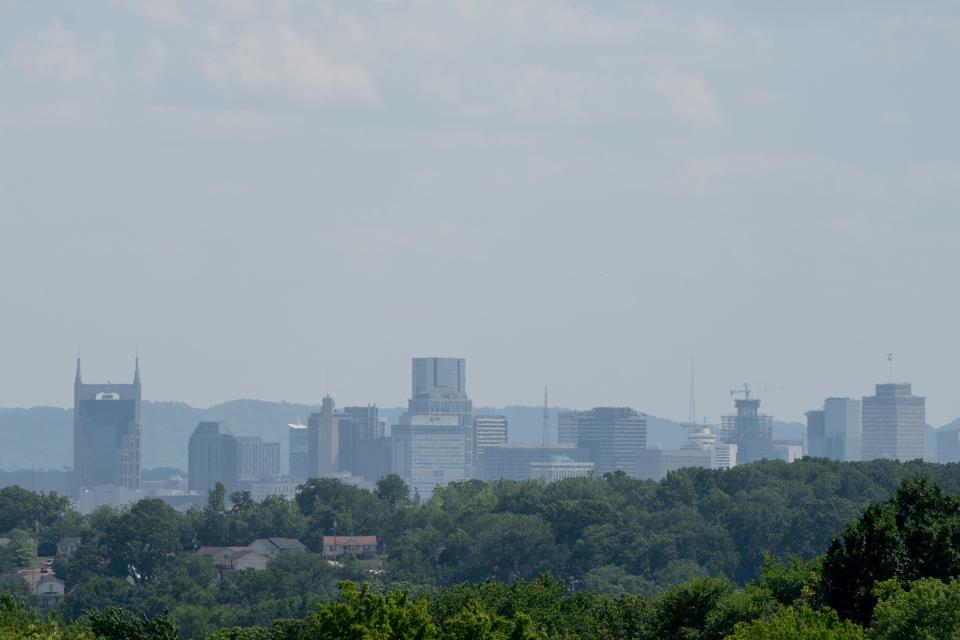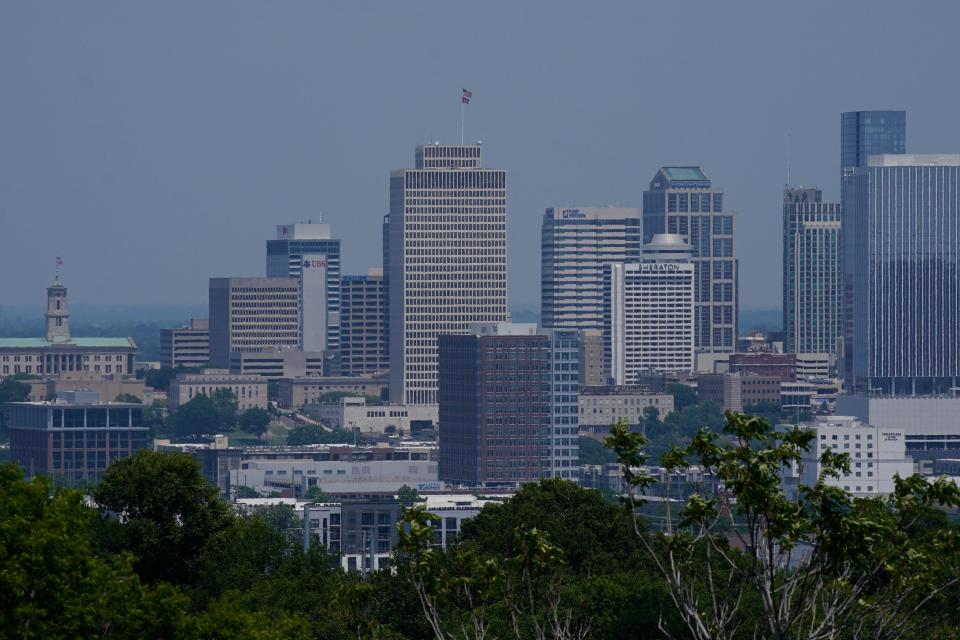What makes Nashville air quality bad? Canadian wildfires, pollution have serious consequences
Tennessee has been spared from the worst effects of Canadian wildfires that recently produced an unhealthy orange haze on the nation's Eastern Seaboard and continue to plague the Upper Midwest. But forests are still burning, and air quality experts say the summer months will be hard on those with chronic breathing and heart issues.
While the state's air hasn't been as bad as in early June when smoke from the fires spread throughout Tennessee, rising temperatures pose their own risks by generating dangerous ground-level ozone.
Fast-growing Nashville is also subject to dangerous fine-particulate pollution, known as PM2.5, which this week reached unhealthy levels and produced telltale hazy air. These conditions are expected to continue throughout the rest of the week.
More: Why is it so hazy in Nashville? Air quality impacted by smoke from Canadian wildfires
Air quality experts say there's no cause for immediate alarm. But Tennesseans should be aware of air quality, particularly if they have health issues or small children, they say.

"If you're going to go out for a run, it would be better to go out early in the day when the ozone levels are lower. Probably the worst time to go would be at 4 or 5 in the afternoon during the afternoon traffic while it's hot," said Dr. Brian Christman, a professor at Vanderbilt University and an expert in allergens and lung health. "Also, if the air quality is really bad, with a high PM2.5/high ozone, it might be better to go to the YMCA or work out at home, make sure your air conditioner is set on recirculate, consider an air (purifier)."
Chicago, Detroit and Minneapolis had the second-, third- and fourth-worst air quality rankings on the planet as of Wednesday thanks to smoke from continuing Canadian wildfires, according to IQAir's air quality index. Nashville remains south of the worst of the smoke plume, but the air quality index notes that the pollution level of PM2.5 in this city on Wednesday was 8.7 times the World Health Organization's recommended guidelines.
This is the worst Canadian wildfire season on record, according to the Canadian Interagency Forest Fire Centre.
"Generally what happens is the smoke goes up in the air and then, once it reaches a certain height, depending on the location, it will descend. The leading edge of the smoke plume, which is the farthest edge, is generally the worst because it carries the finer (farther-traveling) particles, the smaller particles," said Angela Tin of the American Lung Association. "They will cause more health impacts than the larger, bigger particles."
Hazy and unhealthy air
PM is short for particulate matter. PM2.5 is particularly unhealthy because these particulates are so small — roughly 1/60th the width of a human hair — and get deep into a person's lungs and even the bloodstream, Christman said. This type of air pollution is commonly produced through the burning of gasoline, oil, diesel fuel or wood.
"They're so small that they can actually cross the lung barrier and enter the circulation and can get into tiny blood vessels and increase your risk of heart attacks and strokes," he said.
Ground-level ozone, another unhealthy pollutant, is commonly produced when fossil fuels are burned and combine with the sun's ultraviolet rays, according to the Environmental Protection Agency. Ozone can cause mild symptoms like coughing and sore throats. But it can also lead to more severe health problems, including inflamed and damaged airways, making lungs more susceptible to infection and aggravating asthma, emphysema and chronic bronchitis.
While ozone is more of a summertime issue, air quality issues and the health effects associated with them are actually a year-round problem in fast-growing Nashville, said Dr. Stacey Vallejo, pulmonologist intensivist at Ascension St. Thomas West.
"Just being in an urban area where there's lots of traffic, lots of factories and things like that puts us all at risk," Vallejo said.
Good news and bad news on air quality
This is a bad news/good news kind of story.
While the Canadian wildfires and the pollution they're bringing to cities across the United States are objectively bad for air quality, the overall environmental outlook for air quality has been heading in the right direction over the years and decades, air quality experts say.

Tightening air quality regulations mean that, overall, the air is cleaner.
"All states are generally improving," Tin said. "Regulations that the EPA puts on industrial facilities, on combustion sources, the power sources, and every year they ratchet the numbers down, and they have permits and (pollution) limits that these places have to beat. Cars and trucks are also cleaner."
The American Lung Association gave Davidson County a "B" for its overall ozone pollution levels in its 2023 air quality report card. Though Nashville's home county got a "C" for its particle pollution levels.
In a 2022 report, the organization called out Nashville for its "mixed" success in containing pollution, ranking it 66th in the nation for ozone pollution. That was an improvement from its ranking from the prior year, that report notes.
Another wild card: climate change. Warming temperatures contribute to more frequent wildfires and longer wildfire seasons, according to the EPA. The added heat can also contribute to ground-level ozone pollution, the agency notes.
"All of that has an impact, and every single increase in any one area causes a problem in another," Lin said.
Frank Gluck is the health care reporter for The Tennessean. He can be reached at fgluck@tennessean.com. Follow him on Twitter at @FrankGluck.
Want to read more stories like this? A subscription to one of our Tennessee publications gets you unlimited access to all the latest political news, plus newsletters, a personalized mobile experience, and the ability to tap into stories, photos and videos from throughout the USA TODAY Network's daily sites.
This article originally appeared on Nashville Tennessean: Why is Nashville air quality so bad? Canadian fires, pollution to blame

